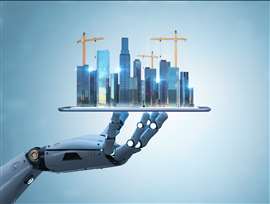Navigating AI’s impact on construction and liability
07 October 2024
Most of us understand at this point that the construction industry has traditionally been slower to adapt technology to its operations, having a relatively large number of tasks which remain manual or semi-manual in operation. But the ever-broadening worker shortage continues to disrupt many of these operations – across all sectors of the larger industry. Enter artificial intelligence.
 As artificial intelligence continues to revolutionize the construction industry, companies must navigate the legal complexities. Photo: Adobe Stock
As artificial intelligence continues to revolutionize the construction industry, companies must navigate the legal complexities. Photo: Adobe Stock
Love it or hate it, artificial intelligence (AI) is transforming the industry, bringing new efficiencies and capabilities to all levels of the workplace. From predictive analytics and risk management to project planning and automation, AI is fast becoming an essential tool in modern construction.
However, as AI’s role expands, the complexity of AI systems raises questions about who is responsible when things go wrong. As a result, it’s becoming ever more important to understand that the integration of AI in construction projects introduces new risks, especially regarding accountability, data privacy and liability.
Accountability and liability
One of the primary legal concerns surrounding AI in construction is determining accountability when AI-driven decisions or actions result in damages, injuries or project failures. Traditionally, liability falls on contractors, engineers or architects. But when AI systems play a crucial role in decision-making, it becomes challenging to assign fault.
For instance, if an AI system misinterprets data and causes a structural failure, who is responsible? Is it the developer of the AI software, the contractor who relied on the AI’s decision or the construction company that employed it? These questions highlight the need for clear legal frameworks that address AI-related liability in construction.
Additionally, the use of AI in construction often involves the collection and processing of large amounts of data, including personal information from workers and clients. This data is used to train AI systems, optimize processes and enhance decision making. However, the mishandling or unauthorized access to this data could result in significant legal repercussions.
Construction companies that implement AI must ensure that they comply with data privacy laws, such as the California Consumer Privacy Act (CCPA) in the U.S. and the General Data Protection Regulation (GDPR) in Europe. Failure to do so could result in costly litigation, not only for data breaches but also for improper use of data in AI systems.
Moving on to contracts, many construction contracts do not currently account for the use of AI, leaving room for disputes over the interpretation of AI’s role in fulfilling contract obligations. For example, if an AI-driven system fails to deliver on a specific task outlined in the contract, it may be unclear how to address the breach. This lack of clarity could lead to protracted legal battles between stakeholders.
Remaining focused
As with almost any business risk, construction companies must continue to proactively understand and address potential legal issues connected with the implementation of AI into their systems and processes. This could involve revising contracts to clearly define AI’s role and establishing liability frameworks for AI-driven decisions. Additionally, construction firms should prioritize data privacy and security, ensuring compliance with relevant regulations to avoid legal challenges.
Further, as AI continues to evolve, construction companies must stay focused on laws and regulations that could impact their operations. By doing so, they can reduce the likelihood of litigation and continue to leverage AI to enhance their projects.
Indeed, AI will almost certainly revolutionize the construction industry, offering numerous benefits in terms of efficiency, safety and cost savings. But as with almost every era of advancement, the benefactors on the front-end of that era’s advancements must stay vigilant, informed and proactive – as to both harness the power of that change, while minimizing its risks.





